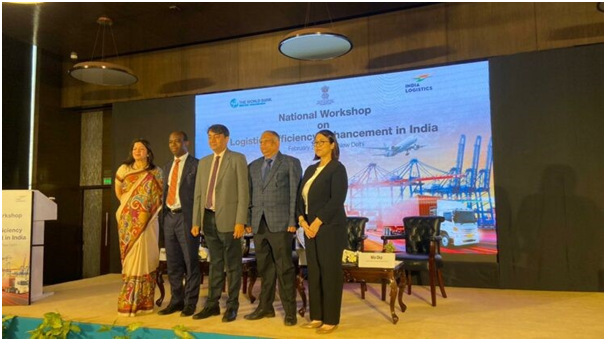
The Department
for Promotion of Industry and Internal Trade (DPIIT), Ministry
of Commerce and Industry in collaboration with
the World Bank Group organised a National
Workshop on Logistics Efficiency Enhancement, on February
27 2024, that brought together the logistics sector community to
brainstorm and identify factors affecting logistics performance and
areas of improvement.
The inaugural session of the
workshop was held in the presence of Additional Secretary, DPIIT, Shri Rajeev S.
Thakur; Joint Secretary, DPIIT, Shri E. Srinivas; Country Director, World Bank,
Mr. Auguste Tano Kouame; and Country Director, Asian Development Bank (ADB),
Ms. Mio Oka. Over 100 participants from
various Ministries/Departments of the Government of India, officials from
States, Multilateral Institutions, and Industry Associations participated in
the event.
The workshop was divided into three sessions. Session I covered discussions
on the approach and methodology adopted in the
calculation of the Logistics Performance Index (LPI) by the World Bank. During
the session, representatives from the World Bank highlighted the change in
the LPI calculation approach and new Key Performance Indicators
(KPIs) that would measure the actual speed of trade around the world, thereby
moving from a perception-based survey
methodology to a more data-based analysis.
Session II discussed the
corridor approach including Bharatmala and Sagarmala Corridors which is
enhancing logistics efficiency, bringing down logistics costs, and increasing
first and last mile connectivity. While Bharatmala project is optimising
the efficiency of freight and passenger movement across the country, by
bridging critical infrastructure gaps, Sagarmala
project is enabling port led industrialization and incentivizing employment
generation.
During session III, officials
from States shared best practices, reforms, and digital initiatives undertaken
to improve logistics efficiency. They
further highlighted the challenges faced by States in achieving goals outlined
in their state logistics policies and key areas where support by the
Central Government, private sector, and other stakeholders are needed.
This workshop greatly contributed to a better
understanding of LPI calculation methodology and its six parameters. Deliberations on databases
such as E-Way Bill, Fastag, etc. emerging from increased levels of digitisation
to ease logistics operations in India, remained the central theme for the day,
followed by the area-based economic corridor development approach adopted by
different Ministries in India. The day’s discussions culminated into a
consensus among concerned Ministries/Departments to develop focused action plans for reducing logistics
cost, improving logistics efficiency, addressing both hard and digital
infrastructure bottlenecks in consultation with DPIIT and concerned
stakeholders.